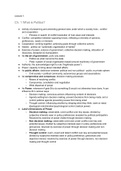Summary
IPOL mid-term exam summary (assigned readings: Introduction to Political Science)
- Course
- Institution
Extensive summary of the assigned readings for the mid-term exam for IPOL. I was graded an 8.1 as a final grade for this class. Good luck studying!
[Show more]



